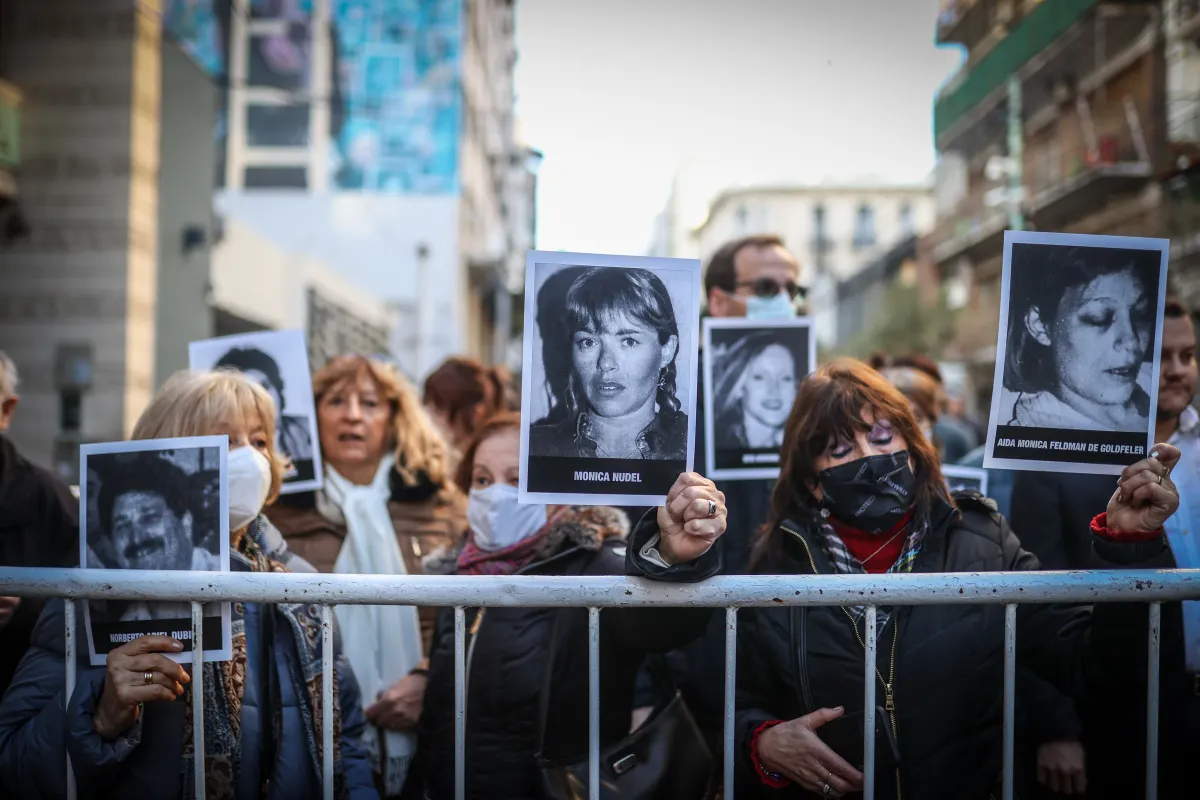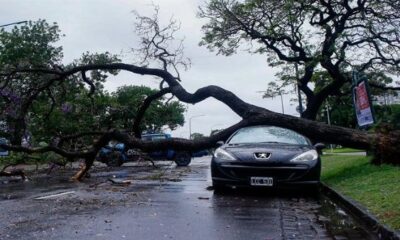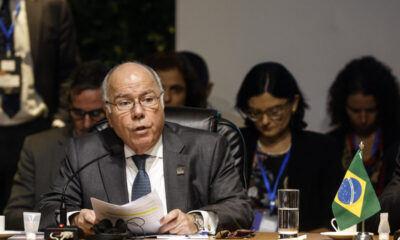International
Argentina will face reforms to promote an ‘trial in absence’ in the ‘AMIA case’

The Government of Argentina “works at full speed” to face reforms to promote a ‘trial in absence’ for the attack committed in 1994 against the Argentine Israeli Mutual Association (AMIA).
The terrorist act left 85 dead and 300 injured and remains unpunished, since it is not possible to judge it with the current legislation.
After the ruling issued by Chamber II of the Federal Chamber of Cassation in ‘Case AMIA II’, which declared as a “crime against humanity” the attack on the headquarters of the AMIA and seals the then Iranian Government and the Lebanese militia Hizbulá of these events, the Argentine Minister of Security, Patricia Bullrich, made that announcement at a press conference.
Although local media reported that the Executive raised the anti-terrorist alert and strengthened security around embassies and airports, Bullrich did not talk about it and limited himself to loading the inks on former Peronist president Cristina Fernández (2007-2015).
According to Bullrich, Fernández “wanted to hide (Iran’s terrorist character) behind a nefarious memorandum that led us to negotiate with the terrorists instead of moving forward with the investigation.”
With this he referred to the Memorandum of Understanding with the Islamic Republic of Iran, signed in 2013, with the aim of bringing positions closer to move forward with the investigation. Despite its approval by the Argentine Congress, the measure was prosecuted and, in May 2014, the law that approved the pact was declared unconstitutional, which never entered into force, because the Iranian Parliament never ratified it.
“The truth is that yesterday was a great day for Argentina,” he said.
The ‘trial in absence’, which is not possible according to Argentine legislation, although there are several bills that seek to enable it, was one of the reforms suggested by the judges of the Criminal Cassation Chamber who issued the ruling.
In addition to being the largest terrorist attack on Argentine soil, the attack on the AMIA was also the largest on Jewish targets outside Israel since World War II.
The Jewish community in Argentina, the largest in Latin America and the fifth in the world, celebrated the ruling, although it demanded an end to impunity for its leaders.
In a statement, the AMIA stated that it receives “in a favorable way” the claim that the attack “responded to a political decision” by Iran, executed by Hizbulah.
According to the entity, on several occasions the AMIA “has expressed that the judicial file accredits multiple evidence, and contains numerous evidences that allowed to establish, from the beginning of the investigation, the role of Iran and its active participation in the decision, organization and financing of the terrorist attack.”
However, he demanded that the intellectual and material responsible “be judged and serve their sentences for the atrocious crime against humanity they committed.”
“Impunity in the AMIA cause is a shameful mark for Argentine history and a debt of democracy,” the text added.
Therefore, and with three months to go before the 30th anniversary of the attack, the entity said that “it will not be satisfied with the arrival of widely known conclusions,” since it considers it “unacceptable” that local legislation is “the same” as at the beginning of the investigation, and asked for the development of “a legal framework that allows improving the conditions of investigation, intelligence, prevention and punishment.”
Also the president of the Delegation of Argentine Israeli Associations (DAIA), Jorge Knoblovits, opined that the ruling issued on Thursday was a cause for celebration for the Jewish community: “We must applaud these judges, who have had courage and probity.”
The DAIA recalled that “this is the line of investigation of the complaint of the prosecutor (Alberto) Nisman,” who led the investigations for 10 years until he was found dead at home on Sunday, January 18, 2015 in strange circumstances; the case, which was characterized as homicide in 2018, remains unresolved.
International
Dominican ‘False Hero’ Arrested for Faking Role in Nightclub Collapse That Killed 231

A man identified as Rafael Rosario Mota falsely claimed to have rescued 12 people from the collapse of the Jet Set nightclub in Santo Domingo—a tragedy that left 231 people dead—but he was never at the scene.
Intelligence agents in the Dominican Republic arrested the 32-year-old man for pretending to be a hero who saved lives during the catastrophic incident, authorities announced.
Rosario Mota had been charging for media interviews in which he falsely claimed to have pulled survivors from the rubble after the nightclub’s roof collapsed in the early hours of April 8, during a concert by merengue singer Rubby Pérez, who was among those killed.
“He was never at the scene of the tragedy,” the police stated. The arrest took place just after he finished another interview on a digital platform, where he repeated his fabricated story in exchange for money as part of a “media tour” filled with manipulated information and invented testimonies.
“False hero!” read a message shared on the police force’s Instagram account alongside a short video of the suspect, in which he apologized: “I did it because I was paid. I ask forgiveness from the public and the authorities.”
Central America
Nicaraguan Exiles to Mark 7th Anniversary of 2018 Protests with Global Commemorations

The Nicaraguan opposition in exile announced on Thursday that it will commemorate the seventh anniversary of the April 2018 protests against the government of President Daniel Ortega and his wife, Rosario Murillo, with events in Costa Rica, the United States, and several European countries.
The commemorative activities—which will call for justice for the victims, as well as freedom and democracy for Nicaragua—will include religious services, public forums, cultural fairs, and other public gatherings, according to official announcements.
In April 2018, thousands of Nicaraguans took to the streets to protest controversial reforms to the social security system. The government’s violent response quickly turned the demonstrations into a broader call for the resignation of President Ortega, who is now 79 and has been in power since 2007.
The protests resulted in at least 355 deaths, according to the Inter-American Commission on Human Rights (IACHR), although Nicaraguan organizations claim the toll is as high as 684. Ortega has acknowledged “more than 300” deaths and maintains the unrest was an attempted coup d’état.
International
Arsenal stun Real Madrid at the Bernabéu to reach Champions League semifinals

Arsenal enjoyed a “historic night” on Wednesday after defeating Real Madrid 2-1 at the Santiago Bernabéu, knocking them out of the Champions League quarterfinals, midfielder Declan Rice said.
“It’s such a special night for this club, a historic night for this club,” said Rice, who scored twice in the first leg in London, speaking to TNT Sports.
The English international was named Man of the Match in both legs — the 3-0 win in London and the second leg in Madrid.
“It’s amazing. I knew we were on an upward trajectory and we’ve done incredibly well in this competition. We deserve it and we have full confidence in our coach. Reaching the semifinals is unbelievable,” Rice added.
-

 International5 days ago
International5 days agoNightclub Collapse in Dominican Republic Claims 226 Lives
-

 International5 days ago
International5 days agoVenezuela accuses Guyana of “warlike intentions” after UK defense deal
-

 Central America3 days ago
Central America3 days agoHonduran Police Offer $135K for Tips Leading to the Arrest of Romeo Vásquez
-

 Central America2 days ago
Central America2 days agoPetro questions Ecuador’s vote, cites reports of military control and arrests
-

 International3 days ago
International3 days agoMPV Denounces Electoral Blockade as Secretary-General is Disqualified for May Elections
-

 International1 day ago
International1 day agoArsenal stun Real Madrid at the Bernabéu to reach Champions League semifinals
-

 International3 days ago
International3 days agoMaduro Plans Major Workers’ March on May 1st to Defend Venezuela’s Freedom
-

 International1 day ago
International1 day agoBogotá residents line up for yellow fever vaccine amid national alert
-

 International1 day ago
International1 day agoMexico refuses to restore ties with Ecuador while Noboa remains in office
-

 International1 day ago
International1 day agoDeSantis’ immigration crackdown sparks alarm in Venezuelan Communities in Doral
-

 International2 days ago
International2 days agoColombia: Search continues for missing limb of italian scientist found dismembered
-

 International8 hours ago
International8 hours agoDominican ‘False Hero’ Arrested for Faking Role in Nightclub Collapse That Killed 231
-

 Central America8 hours ago
Central America8 hours agoNicaraguan Exiles to Mark 7th Anniversary of 2018 Protests with Global Commemorations









































